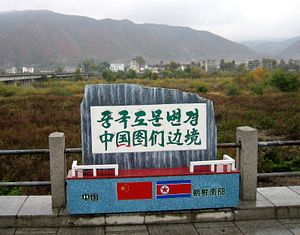North Korea has ramped up border security after citizens took advantage of recent havoc-wreaking floods to flee the country, multiple sources have said.
Kim Jong-un’s regime has been cracking down on the border with China after citizens used floods caused by Typhoon Lionrock to flee, a North Korean defector with contacts inside the country told The Diplomat.
The defector, who asked to be identified only as Mr. Kim, said floods that ravaged North Hamgyong Province in late August had killed border guards and swept away fencing and CCTV cameras, sparking a small uptick in defections. Kim, who remains in communication with a network of people in his homeland, said the defections prompted authorities to launch a crackdown in which a number of his contacts were arrested.
“It seems like people are defecting because Kim Jong-un’s government has no future and people are getting into more and more difficulty,” said Kim from Seoul, the South Korean capital. “It wasn’t a case of the people all saying let’s use these floods to all defect together. It looks like they used the space opened up after barbed wire fences were swept away to defect. Some people succeeded in defecting and some apparently didn’t.”
Kim’s information aligns with a report published Wednesday by Radio Free Asia, which, citing sources inside North Korea, described the state security services creating a “spider web” along the flood-hit border. As well as looking for defectors, authorities were searching homes for banned media, mobile phones, and other electronic devices, the U.S. government-funded outlet reported.
At the same time, Chinese authorities have tightened security on their side of the border to ward off defectors, whom Beijing views as illegal economic migrants. Residents in the Chinese border village of Kaishan have been assisting in the repair of damaged fencing, reported the Daily NK, while local authorities have erected signs threatening fines for anyone found helping “escapees from our neighboring country.”
The floods have left at least 138 people dead and another 400 missing, according to the United Nations, which relies on data from Pyongyang.
In an unusual admission of fragility, North Korea’s state media called the disaster its worst since the Japanese occupation, which ended in 1945 when the U.S. dropped atom bombs to force Japan’s surrender at the end of World War II. North Korea is especially vulnerable to flooding due to intense deforestation carried out for agriculture, and its creaking state services are ill-equipped to manage natural disasters.
Despite a spate of high-profile defections this year, including that of Deputy U.K. Ambassador Thae yong-ho, the number of people arriving in South Korea from the North has slowed since Kim Jong-un took over from his father at the end of 2011. Last year, 1,277 North Koreans settled in South Korea, according to the country’s Ministry of Unification, the lowest number in 13 years. The figure peaked at 2,914 in 2009, before dramatically declining during Kim’s first year in power and remaining below pre-2012 levels.

































